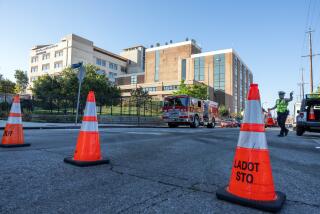Radiation overdoses found at second hospital
- Share via
A second hospital in Los Angeles County has discovered that patients were receiving overdoses of radiation from CT scans used to diagnose strokes.
Ten patients at Glendale Adventist Medical Center this year accidentally got three to four times the normal radiation dose, hospital officials said Friday.
In August, Cedars-Sinai Medical Center in Los Angeles found that after being reprogrammed, a General Electric scanner began delivering eight times the normal dose to patients receiving the same procedure, known as a CT brain perfusion scan.
The problem at Cedars- Sinai went undetected for 18 months while 260 people received overdoses.
As a result, county radiation safety officials began looking for the problem at other hospitals that offer the scans. They discovered it in another General Electric scanner at Glendale Adventist during an inspection Tuesday.
Sarah Kissell, a spokeswoman for the county Department of Public Health, said that no other cases have been found in Los Angeles County and that the investigation is almost complete.
State health officials who have been overseeing the investigation could not be reached for comment. It is unclear whether they have been looking at scanners elsewhere in the state.
It also remains unclear who bears responsibility for the problems -- the hospital, General Electric or some combination of the two. In both cases, the problems began when the hospitals programmed the scanners with new computerized instructions.
Officials from General Electric could not be reached for comment. The company previously denied responsibility in the Cedars-Sinai overdoses.
At Glendale Adventist, officials said that the overdoses began in January after the hospital started using a new scanning protocol for patients suspected of having suffered strokes within the previous three hours. It was aimed at quickly giving doctors a clearer picture of strokes, a disruption of blood flow in the brain. No other scanning patients were affected.
A technician from General Electric, the manufacturer of the scanner, helped program the machine with the new instructions, said Michael Chee, a spokesman for the hospital. He said that GE workers have been examining the Glendale scanner this week, trying to diagnose the problem.
“We don’t have a clear answer yet,” he said.
The scanner is a less powerful model than the one used at Cedars-Sinai and therefore subjected the patients to far less radiation, he said.
In the Cedars-Sinai cases, radiation experts said that the probability of brain tumors -- the most serious risk -- was low, perhaps 1 in 600 for each scan. Some patients received multiple scans. Roughly 40% of the patients lost hair as a result of the overdoses.
Glendale Adventist officials described the risk to their patients as “minimal.”
All 10 patients have been notified, officials said, and were offered free monitoring for potential side effects. One experienced hair loss.
In the wake of the discovery at Cedars-Sinai, the U.S. Food and Drug Administration issued a warning to hospitals across the country to check their scanners. The FDA has not reported any new overdoses, but a spokeswoman said Friday that the agency is still investigating.
More to Read
Sign up for Essential California
The most important California stories and recommendations in your inbox every morning.
You may occasionally receive promotional content from the Los Angeles Times.










